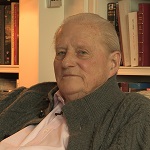














































|
Editor's pick
|
The most popular stories
|
|||||||||||
|
Growing muscle and nerve cells Gerald Fischbach - ScientistEach stage of my career I moved up the science ladder, from when I began at Cornell, working on the neuromuscular junction, trying to find evidence that acetylcholine had a presynaptic action. And I did, but its primary action was on the postsynaptic membrane. My tour after that at the NIH, where my science broadened. Not only did I work on the rodent neuromuscular junction, on the cat tenuissimus muscle. It would scare the hell out of Ruth because I told her my experimental subjects were stray cats and she couldn't tolerate that. At the NIH I stuck with mice and rodents but began a new area which became the focus of my career: growing muscle and nerve cells in tissue culture. No one had been doing that. But I had this idea that if I wanted to see how a nerve contacted a muscle, I want the very earliest events. Where studying a rodent at 7 to 20 days of embryonic development and postnatally wasn't high enough resolution. I needed something you could observe minute by minute. So, the thought occurred to me, and I had been reading a bit about some people doing muscle cultures, I can't recall all the names now. But there was a very prominent effort in dissociating myoblasts from skeletal muscle and plating them at culture. I met a man named Mark Nameroff who had worked in all of these prominent labs, but was now at Walter Reed, when I was at the NIH nearby. We got together and he taught me how to dissociate these embryonic cells and place them in culture. We became friends and we collaborated on one paper. |
|